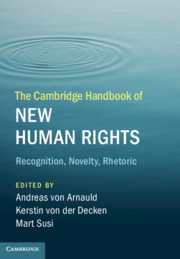Book contents
- The Cambridge Handbook of New Human Rights
- The Cambridge Handbook of New Human Rights
- Copyright page
- Contents
- Figures
- Contributors
- Acknowledgements
- Introduction
- Part I Cross-Cutting Observations
- Part II Public Good Rights
- Part III Status Rights
- Part IV New Technology Rights
- Part V Autonomy and Integrity Rights
- The Right to Bodily Integrity
- 28 The Right to Bodily Integrity
- 29 From Bodily Rights to Personal Rights
- The Right to Mental Integrity
- Rights Relating to Enforced Disappearance
- The Right to Diplomatic and Consular Protection
- Part VI Governance Rights
- Index
28 - The Right to Bodily Integrity
Cutting Away Rhetoric in Favour of Substance
from The Right to Bodily Integrity
Published online by Cambridge University Press: 04 January 2020
- The Cambridge Handbook of New Human Rights
- The Cambridge Handbook of New Human Rights
- Copyright page
- Contents
- Figures
- Contributors
- Acknowledgements
- Introduction
- Part I Cross-Cutting Observations
- Part II Public Good Rights
- Part III Status Rights
- Part IV New Technology Rights
- Part V Autonomy and Integrity Rights
- The Right to Bodily Integrity
- 28 The Right to Bodily Integrity
- 29 From Bodily Rights to Personal Rights
- The Right to Mental Integrity
- Rights Relating to Enforced Disappearance
- The Right to Diplomatic and Consular Protection
- Part VI Governance Rights
- Index
Summary
What we should be able to do to our own bodies and the bodies of our loved ones is at the heart of many questions tackled by medicine, law and social policy. A central aspect of these questions concerning the body revolves around maintaining its physical integrity. It is widely held that preserving the physical integrity of the body is inherently valuable and that transgressing this integrity represents a distinctive form of wrongdoing. Indeed, some have argued that physical integrity is so important that we should have a right to bodily integrity (RBI). This chapter seeks to examine the nature and implications of such a right. In the first section I provide a brief overview of and legal pedigree for the RBI – concentrating primarily on human rights sources and discourse around protections of the physical integrity of the human body. In the second section I flesh out and develop some of the central conceptual underpinnings of the notion of bodily integrity and normative implications of how the RBI has been understood and interpreted within the literature, legal doctrine and public policy. In the third section I explore what is new with the RBI – in particular the development of a specified, derivative right to genital integrity and claims that such a right would entail that a commonly practised medical procedure would constitute a human rights violation.
- Type
- Chapter
- Information
- The Cambridge Handbook of New Human RightsRecognition, Novelty, Rhetoric, pp. 363 - 377Publisher: Cambridge University PressPrint publication year: 2020
- 4
- Cited by



